This is one of the most common questions that is directed to the Mowgli team. While we address it in our workshops and mentoring awareness sessions, we realise that there are many different interpretations and assumptions around Mentoring. At Mowgli we focus on 360-degree mentoring which supports the personal and professional, rather than just technical or business mentoring. In this way, the confidence and resilience of the individual is built, not just the business/profession.
What might a definition for this be? Simply put, mentoring is a trust-based relationship between two people where the agenda and direction is set by the mentee. Being an entrepreneur and leader can be a difficult and lonely journey; having someone impartial, to think through challenges, discuss options and find solutions with is critical. Mentors can act as a sounding board, but also a guide who share their knowledge with no vested interest in their mentees other than to see them realise their full potential.
“The mentoring journey is about people. It’s about mastering emotional intelligence and managing the ‘I have the answer’ ego. The journey is about believing in the human ability to explore and find one’s own solutions for the challenges one is facing, building and nurturing mindsets as well as thinking patterns to become multidimensional and solution oriented. This is a journey everyone should experience as I have.” Biruk Yosef, Mowgli Mentor, Ethiopia.
A good mentor therefore needs to be able to:
- Question
Asking thought-provoking questions facilitates self-reflection and self-development on the part of a mentee.

Critical to this skill is a mentor’s awareness that it is not his/her role to solve problems for the mentee or to do the work for him/her.
“Before we came to this programme we developed a feature for our product based on what we thought was good for our customers, but during the programme our mentor kept asking us ‘What if the customer doesn’t need this product feature?’. After that, we asked our customers if they needed this product feature, and the result was unexpected, we found out that they didn’t need the feature. This taught us an important lesson which is; before developing product features and services, it’s better to walk in the customers shoes.” Biruk Girma, Mentee, blueMoon Mentoring Programme, Ethiopia
2. Listen actively
Listening is a core skill in mentoring.

In our mentor training workshops, we emphasize a lot on the need for active listening which involves listening to what is not being said. A good mentor needs to focus on everything that surrounds and accompanies a mentee’s words including their emotions, energy levels, and tone of voice. It’s only through listening that a mentor will be able to ask powerful questions and provide constructive feedback to the mentee.
“Listening and exploring are the key for successful communication.” Ala’a Mohammed Suleiman, Mowgli Mentor & Facilitator, Jordan
“Mentoring to me is listening to each other without judging and exchanging experiences.” Dalal Al Kabkabi, Mentee, Athar Mentoring Programme, Saudi Arabia
One doesn’t have to be an expert to mentor but rather a good listener who is able to probe the mentee, and not to offer solutions but an opportunity for the mentee to discover their own way.” Victor Kimanthi, Mentor, Imarisha Mentoring Programme, Kenya
3. Provide objective feedback & guidance
Good and constructive feedback highlights blind spots that a mentee may not be able to see, and address them whether positive or negative.

A mentor is not there to tell you what to do, but instead to help you to think through the options. They may sometimes makes suggestions or offer guidance on what they might do in your position— if you want to hear that. But of course, it is up to you to decide whether it is right for you to go in this direction.
“I liken mentoring to the road signs we encounter on any journey. These signs act as guidelines on the directions we need to take to reach our destination and sometimes, what to expect on the journey.” Alex Peru Khaemba, Mentee, Imarisha Mentoring Programme, Kenya
“It feels good to have a neutral person who has no vested interest in the business give feedback, because then, the feedback is raw and sincere. Having a mentor has given me someone who I know has got my back and that in itself makes a huge difference.” Justine Awino, Mentee, Imarisha Mentoring Programme, Kenya

